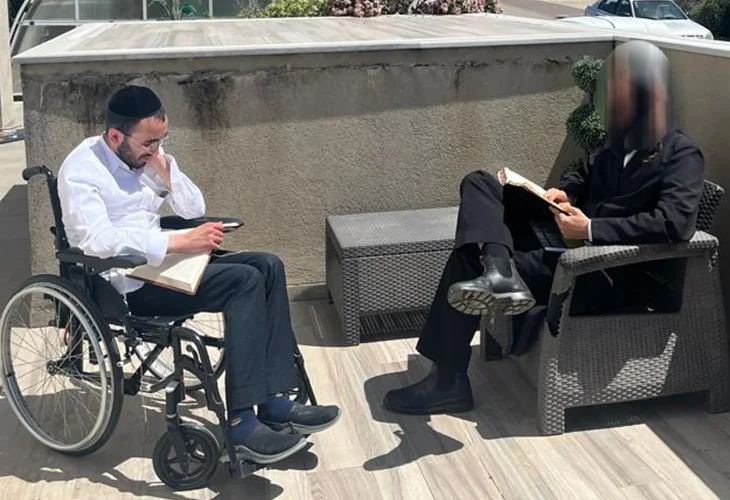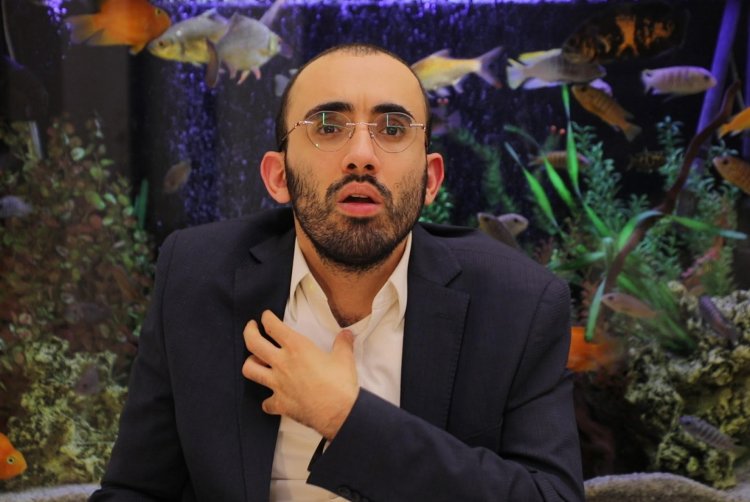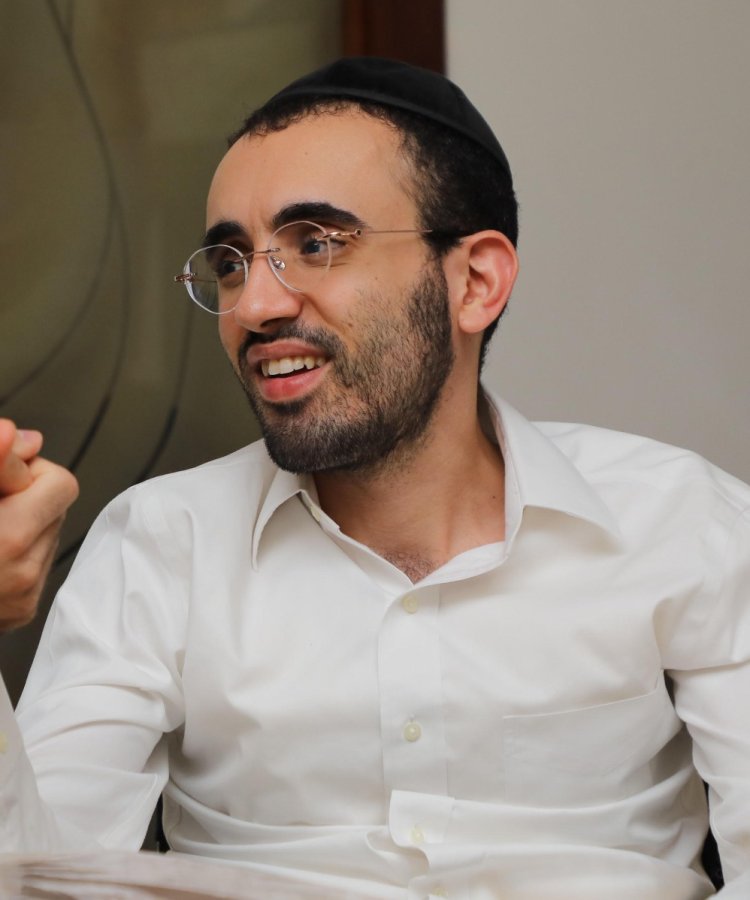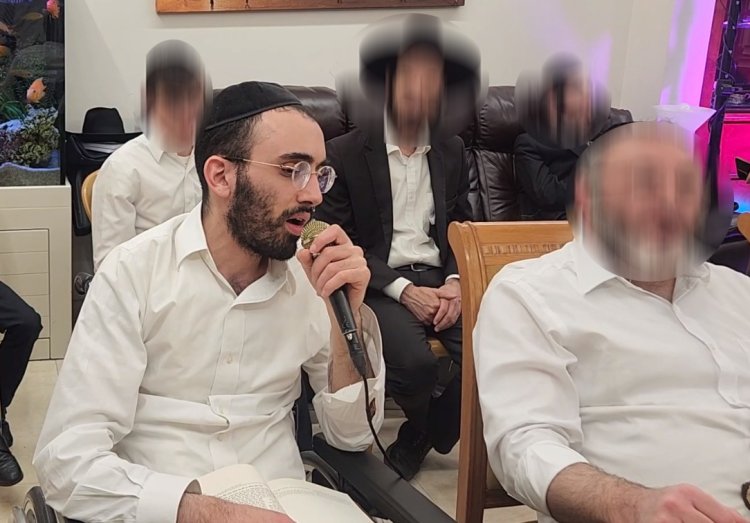Embracing Life's Challenges: Moshe's Journey of Faith and Resilience
Diagnosed with multiple sclerosis at 20, Moshe Ziyatt discovered a new world of faith, acceptance, and a profound connection with Hashem. He shares his heartfelt insights and the deeply meaningful life he leads.

What happens to a typical yeshiva student when one day his life is turned upside down, and he learns he has a chronic illness affecting the central nervous system, including the brain and spinal cord? If you had asked Moshe Ziyatt this question over a decade ago, he would have undoubtedly shuddered at the thought.
"I was completely healthy, with no medical history whatsoever. There was nothing to make me suspect I might experience something like this," he says. Then, he was thrown into a stormy sea of tough challenges and learned that, especially when things don't make sense, one can find a connection with Hashem.
"The journey I'm on is not easy," he acknowledges honestly, "There are moments when I feel all Hashem asks of me is to be silent. But over time, I discovered one thing - because of what I'm going through, I have achieved a special and very personal relationship with Hashem, and that's something I wouldn't trade for anything. Today, after years of facing this and meeting others in similar situations, I can say with certainty that those who face challenges have the privilege of developing a special and intimate bond with Hashem, so yes, I am blessed, simply blessed."

Getting the Diagnosis
Take us back to the beginning. How did the illness get discovered?
"I was twenty, young, healthy, and strong. One day, I traveled to pray in Meron, and after leaving the resting place of Rabbi Shimon Bar Yochai, I felt numbness in my hands, as if they'd fallen asleep. At first, I thought it was from the cold, but when I returned to the yeshiva, the sensation persisted and intensified."
At the time, he hadn't considered it might be something serious, but due to the discomfort, he consulted a doctor who referred him to a neurologist for an MRI, which led to a decisive result: multiple sclerosis.
How does a young man feel receiving such news?
"In my case, divine providence spared me the trauma of a dramatic sit-down with a doctor delivering the worst. Although I was diagnosed, hardly anything was explained, and naively, with a type of optimism, I thought it was temporary. As the days passed, I gradually learned to understand the situation and the seriousness of the illness. But it wasn't sudden, allowing me the freedom to choose how to perceive the diagnosis and continue to see myself as free, even when mobility and function were seriously impaired."
How did your surroundings react? Was there support?
"Now I understand my family and friends were eager to help and support, but I didn't allow them. Initially, I fought hard to remain a 'normal' person like everyone else, avoiding any need for support. That's why every attempt at empathy was swiftly rejected. Now, being in a different place, I recognize the many open hearts of family and friends who wanted to participate and support. Today, I gladly accept help when needed and am not ashamed of it."

The Throne of Acceptance
A significant stage in Ziyatt's journey was transitioning to a wheelchair. "It happened a few years after the diagnosis," he shares. "At first, I resisted the move to a wheelchair with all my might because I'm naturally quite stubborn and rebellious. I fought hard not to end up in that chair. But a time came when I realized it was the thing holding me back from accepting my limitations. When this realization hit, I energetically took on the 'wheelchair project,' understanding it was the last barrier between me and freedom. The wheelchair took me to a wonderful place, giving me a quality of life I hadn't imagined."
"Incidentally, often when using the wheelchair, I hear from people around me saying things like, 'With Hashem's help, you won't need it.' I, of course, should answer 'Amen,' but with all due respect to their blessing, I feel this statement is a bit unnecessary. I don't really perceive the wheelchair as something I 'need' but as a role, a mission, another way to submit to the King of Kings. Hence, I refer to it as 'the throne of acceptance' as it allows me to contribute to the crowning of Hashem over the world. While the blessing is full of empathy and solidarity, it feels somewhat redundant."
What else challenges you besides the chair?
"Truthfully, thank God, I don't have many challenges. Even the treatments and physiotherapy are tasks I view as Hashem's assignments, unrelated to the diagnosis. So I'm not anxious about seeing results. However, with a condition like multiple sclerosis, even in stable times, the situation can change with the weather or exertion, bringing many moments of weakness and exhaustion. For instance, there are times when I want to get up from the wheelchair to move to the car, yet am unsure how to perform this task, realizing only a special one can help."
"This understanding gives me strength even in complex situations, like contemplating things I might be missing out on. In such times, I focus on the belief that Hashem has placed me in the most precise and good place for me. He is leading me at every moment, desiring the best life possible for me. While optimism doesn't typically pair well with chronic illness, given the disappointments and ever-changing plans, there's only one remedy: to release, let go, and surrender the reins to the King of the world. This is the sole and genuinely useful optimism available to everyone."

Simply Yield
Were you so connected to Hashem before the illness?
"To be honest, no," he surprises. "Before being diagnosed, I had no connection with Hashem. Although I was a yeshiva student observing Torah and mitzvot, I never knew I could have a personal relationship with Hashem; I thought that was for great tzaddikim. Yet shortly after the diagnosis, Hashem infused me with new energies of faith and trust. It was new to me, but I loved it and realized that's where my life lies. From then on, I've walked into a new world of faith, progressing step by step on an endless path."
His relationship with Hashem, as he describes, developed in two phases: "Initially, I clung to prayer and strong hope that I would one day be healthy, wishing for a better future. Later, with some changes in circumstances, I found a connection on a higher level, independent of any future event, a fundamental relationship that isn't conditional."
These are quite high-level concepts. Can you apply them practically in daily life?
"Yes, because that's exactly what's asked of me. Recently, I published a book with thoughts and insights from my experiences. I wrote there what's required of me, and essentially everyone else, to surrender to Hashem, agree with the current state, and say 'Yes! I approve, I accept.' After all, Hashem placed me in a situation lacking nothing, giving me everything, though not how I expected or planned my life. It's the wonderful, sweet burden laid upon my shoulders to yield and say, 'Yes! Here I am!'"
He also shares a message for anyone facing challenges, no matter the reason: "It's crucial to remember that the good, beautiful life isn't necessarily found in achieving our wants," Ziyatt emphasizes, "Sometimes it's found when we let go, surrender, and make space for the will of the King of the world. That's where the truly beautiful, successful life is, and where the most remarkable achievements happen."
To read Moshe Ziyatt's life story,click here

